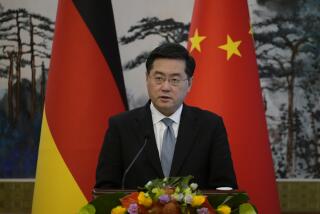Silkworm Missile Off World Market, China’s Envoy Says
- Share via
WASHINGTON — Han Xu, Chinese ambassador to the United States, said Tuesday that China has stopped selling Silkworm anti-ship missiles on the international arms market to prevent their diversion to Iran.
Han described China’s cutoff of the Silkworm sales as a recent one. Over the last few weeks, he said, “no Chinese Silkworms” have been sold on the international market. “Because we cannot control the international market . . . now we are trying to confine any sales of Silkworms,” he said.
The Chinese ambassador, speaking at a breakfast meeting with The Times Washington Bureau, did not define what he meant by the “international arms market.” He did not specify whether the cutoff of Silkworms applies to foreign governments, such as North Korea, as well as to private arms dealers. In the past, North Korea has served as a conduit for Chinese arms sales to other countries.
But a State Department official said he believes that China’s new policy applies to foreign governments. “We would think there would be no word games here,” the official said.
But another said he was skeptical: “It may not be true. We have to keep watching.”
The issue of Silkworm sales has been extremely sensitive because U.S. officials say that Iran has deployed the missiles near the Strait of Hormuz, the passageway at the southern end of the Persian Gulf through which much of the crude oil bound for Western Europe and Japan must pass.
On Oct. 16, a Silkworm apparently fired by Iranian forces heavily damaged the Sea Isle City, one of the Kuwaiti oil tankers re-registered under the American flag as part of the U.S. tanker escort effort.
After a series of meetings in Beijing earlier this month, Under Secretary of State Michael H. Armacost told a press conference that China has pledged “to undertake strict measures” to prevent a diversion of Chinese arms to Iran.
That appeared to leave the door open for China to contend that it was selling Silkworms overseas with the understanding that they would not be resold to Iran. Armacost did not say he had obtained promises of a ban on the supply of Silkworms to the international market but a Chinese Foreign Ministry spokesman indicated that that would be the new policy.
Last June, Frank C. Carlucci, then President Reagan’s national security adviser, publicly criticized China for supplying Silkworms to Iran. The U.S. complaints culminated last month in a decision to stop the liberalization of high-technology exports to China.
China has repeatedly maintained that it has never sold any Silkworms directly to Iran. “Let them (U.S. officials) search out the hard proof,” Han, the Chinese ambassador, said Tuesday. “There is no hard proof.”
U.S. officials have insisted that they have proof. The evidence is said to consist of pictures of crates containing Silkworms being loaded onto ships at Chinese ports, and pictures of the same crates being unloaded at Iranian ports. Armacost reportedly showed these pictures to Chinese officials in Beijing this month, but Chinese officials steadfastly continued to deny any involvement in the Silkworm sales.
More to Read
Sign up for Essential California
The most important California stories and recommendations in your inbox every morning.
You may occasionally receive promotional content from the Los Angeles Times.













